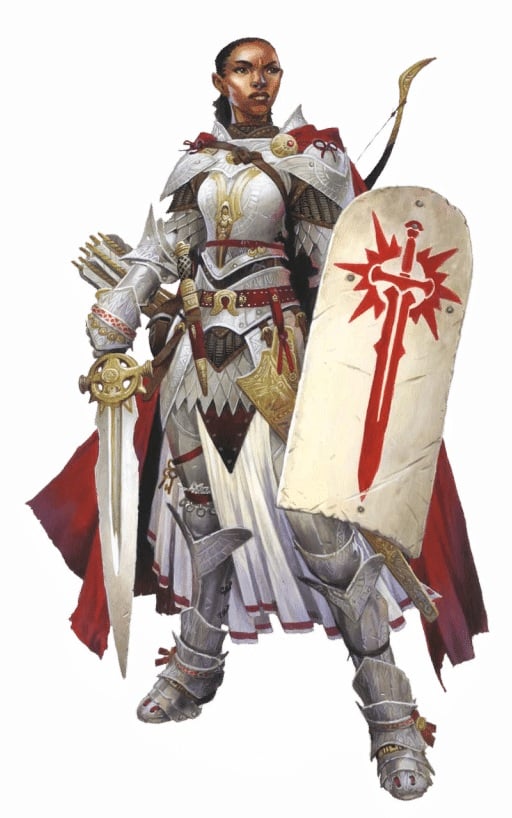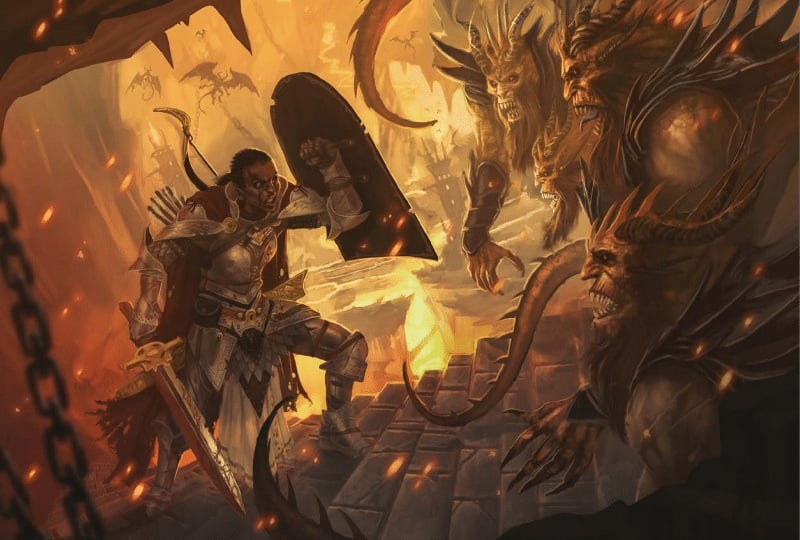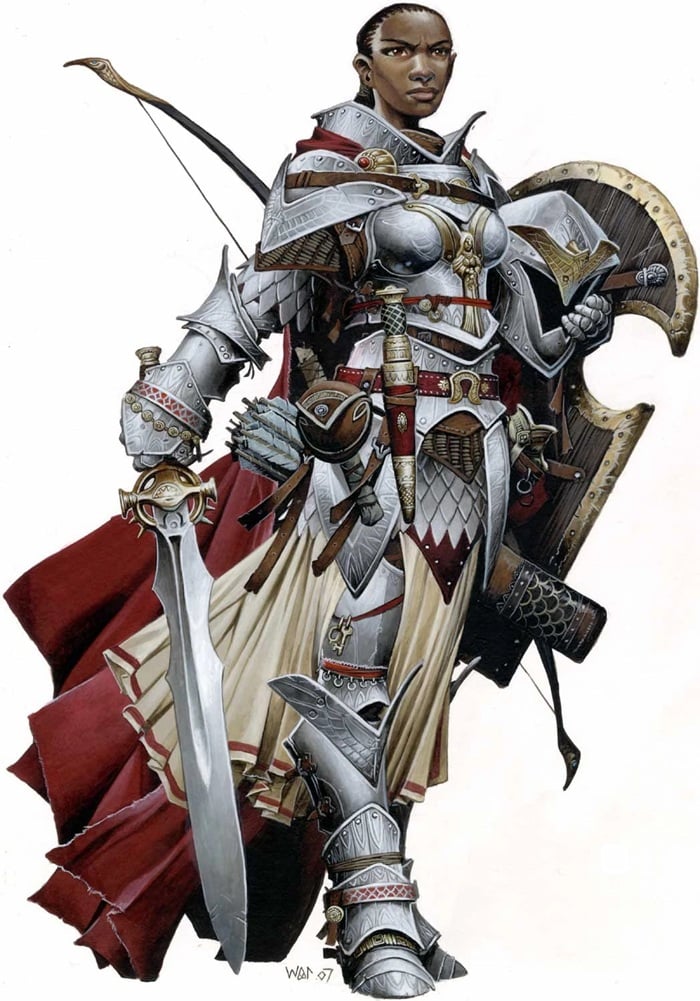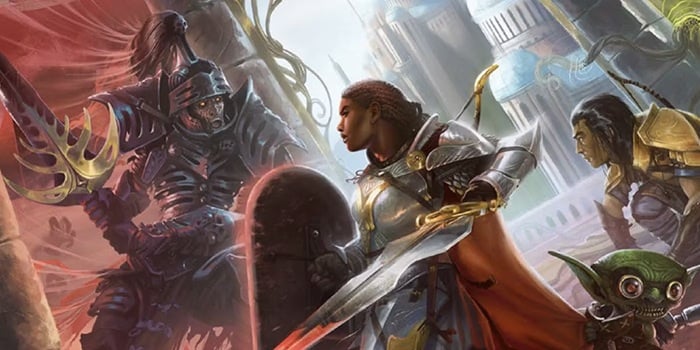Pathfinder Guide: How to Play a Champion
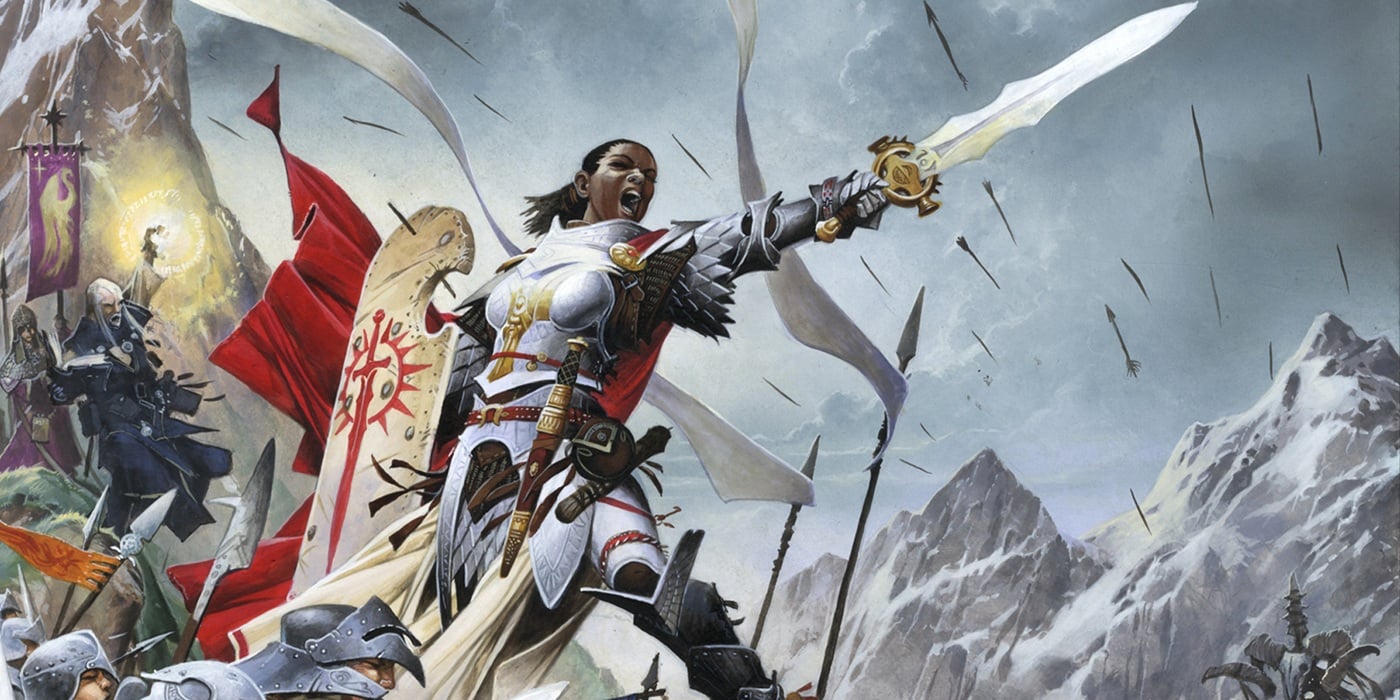
The Pathfinder Champion’s devotion to their cause, deity, and allies makes them one of the most steadfast and reliable party members.
The Pathfinder Champion is the wielder of massive divine power because they are the emissary of their chosen deity. For the adventurer who wishes to devote their life to a god, a Champion has access to powerful attacks and defenses that they can not only wield themselves, but share freely with their allies and innocent bystanders alike.
The Pathfinder Champion Basics
Champions are a fairly physical class and prioritize their Strength and Dexterity, taking a boost to one of those two attributes at character creation. To start, Champions also take expert-level training in their fortitude and will saving throws as well as training in perception, reflex, religion, simple weapons, martial weapons, unarmed attacks, unarmored defense, all armor, one additional skill determined by their deity, and a number of other additional skills equal to their Intelligence modifier plus two.
In combat, Champions a very direct and hands-on kind of fighters. They will engage in hand-to-hand or melee combat. But they will also work to carefully position themselves in such a way to protect their allies and any nearby innocent bystanders.
Out of combat, Pathfinder Champions may attempt to take on the role of one of the party’s spiritual and and morel guide. When they speak, they do so with authority and are sure to embody the core values of their chosen deity. They will provide inspiration, attempt to overcome barriers – both physical and spiritual – and provide guidance to friends who may seek it out. In their personal time, Champions will engage in prayer or silent contemplation as well as physical training. In short, the Champion is one of the classes most likely to feel more than a little overprotective over their allies and party members. This protectiveness may come out as physical protection, spiritual guidance, friendly advice, or something else.
Deities
The biggest source of power and inspiration for the Pathfinder Champion comes from their relationship with their god. Which means that picking your character’s deity will be very important and formative to who they are as an adventurer. There are many deities to choose from in Pathfinder with a wide range of goals, beliefs, and aesthetics.
For example, Desna is a goddess known for placing stars in the heavens to help guide travelers, while Rovagug is the imprisoned god of destruction, disaster, and wrath.
Dependent on which deity you choose for your Champion to follow, they will gain training in a skill as well as edicts and anathema. These may fundamentally form how your character acts, what they believe in, and what they are looking to fight against. Their choice in deity will also give them their sanctification, making them either holy or unholy. Finally, this will affect the character’s Deific Weapon as well as their Champion’s Aura.
Cause
Similarly, the Pathfinder Champion will chose a cause to devote themselves to in their deity’s name. Their choices for Cause include:
Desecration: These Champions unholy and aim to selfishly corrupt and destroy. They work to subvert, corrupt, and sow doubt in those holding ideals of purity.
Grandeur: This cause is considered holy and those who chose it aim to exemplify the glory of the celestial realms. Their goal is to act as an example to others.
Iniquity: Champions with the Iniquity cause are also unholy. They are known to act with dishonor, destroy, and will take advantage of situations and people.
Justice: If a Champion is driven by the cause of justice, they aim to follow and uphold the law. They will also give out just punishments.
Liberation: These Champions fight for freedom and oppose tyranny. They fight for others freedom to make their own decisions and respect the choices people make for their own lives.
Obedience: In comparison, Champions who follow the cause of obedience enforce and follow hierarchies and order. When they feel one is illegitimate, they will work to topple that hierarchy. And when they feel they are best suited to it, they will take up the task of leadership.
Redemption: This cause is also considered holy. These Champions try to redeem those who have committed wicked deeds. They are compassionate to others, regardless of their authority or station. And they would never kill someone without first offering them a chance at redemption.
Multiclassing a Pathfinder Champion
For the adventurer who wishes to swear a holy oath to their deity, multiclassing as a Champion will give them access to even more powers to aid their cause and their party. This multiclass will often increase defense. And it can be a natural choice with a deity themed to your character’s class; for example, Nethys for a Wizard-Champion multiclass.
Adventurers multiclassing as a Champion will gain access to the feats Champion Dedication, Basic and Advanced Devotion, Champion Resiliency, Devout Magic, Champion’s Reaction, and Devout Blessing.
How to Play a Pathfinder Champion
When it comes to knowing how to play your Champion, what their goals and inspirations are, and even what their backstory may look like, the deity and cause you choose at character creation will matter so much. On one hand, this means that if you have a clear image of your character in mind, this step may be easy. Choose whichever is closest to what you already have in mind. But if you don’t know yet, that’s okay. I’ve definitely come up with most of a character’s backstory weeks after gameplay had started. And Champion makes that a little easier by making you pick core aspects of who they are at the beginning. There’s no rule against picking whatever you think would be most fun as the player, and building everything else around that base later.
In gameplay and combat, Champions have the potential to be a little over the top. And that can be a lot of fun, both for you as the player and the GM. But don’t forget that it’s not all strict moral codes and high horses. Champions- even the ones with unkind deities or unholy causes- will feel the call to protect their party members. It may be the ‘this wizard is my nerd and only I can bully them’ energy of your least favorite older sibling, but it has its own sort of charm.
Remember your Shield Blocks to reduce incoming damage. And while they may not be your first priority on the battlefield, don’t forget about the spells. These things can be make-or-break in encounters. Your character should be strong and powerful, sure. But more than anything, the Champion is steadfast and reliable.
Happy adventuring!

